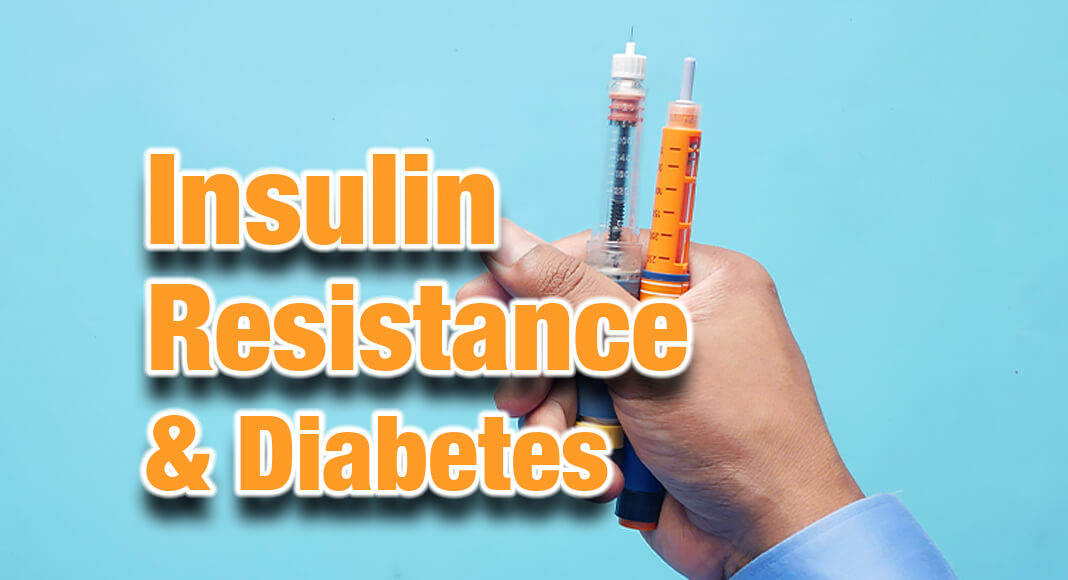
Mega Doctor News
Invisible changes in the body begin long before a person is diagnosed with type 2 diabetes. That’s both bad news (no symptoms mean you won’t know you have it) and good news (you can prevent or delay it if you’re at risk). One of the most important unseen changes? Insulin resistance.
Insulin, Blood Sugar, and Type 2 Diabetes
Insulin is a key player in developing type 2 diabetes. This vital hormone—you can’t survive without it—regulates blood sugar (glucose) in the body, a very complicated process. Here are the high points:
- The food you eat is broken down into blood sugar.
- Blood sugar enters your bloodstream, which signals the pancreas to release insulin.
- Insulin helps blood sugar enter the body’s cells so it can be used for energy.
- Insulin also signals the liver to store blood sugar for later use.
- Blood sugar enters cells, and levels in the bloodstream decrease, signaling insulin to decrease too.
- Lower insulin levels alert the liver to release stored blood sugar so energy is always available, even if you haven’t eaten for a while.
That’s when everything works smoothly. But this finely tuned system can quickly get out of whack, as follows:
- A lot of blood sugar enters the bloodstream.
- The pancreas pumps out more insulin to get blood sugar into cells.
- Over time, cells stop responding to all that insulin—they’ve become insulin resistant.
- The pancreas keeps making more insulin to try to make cells respond.
- Eventually, the pancreas can’t keep up, and blood sugar keeps rising.
Lots of blood sugar in the bloodstream is very damaging to the body and needs to be moved into cells as soon as possible. There’s lots of insulin, too, telling the liver and muscles to store blood sugar. When they’re full, the liver sends the excess blood sugar to fat cells to be stored as body fat. Yep, weight gain. And what’s more serious, the stage is set for prediabetes and type 2 diabetes.
Do You Have Insulin Resistance?
How do you find out if you’re insulin resistant? No one test will tell you, but if you have high blood sugar levels, high triglycerides (a kind of blood fat), high LDL (“bad”) cholesterol, and low HDL (“good”) cholesterol, your health care provider may determine you have insulin resistance.
Important note: Type 1 diabetes is different; it’s thought to be caused by an autoimmune reaction (the body attacks itself by mistake). People with type 1 diabetes don’t make enough insulin and need to take it to survive.
What Causes Insulin Resistance?
It isn’t clear exactly what causes insulin resistance, but a family history of type 2 diabetes, being overweight (especially around the waist), and being inactive all can raise the risk.
You do not have to be overweight to have insulin resistance. You can’t tell if someone has insulin resistance by looking at them.
How to Reverse Insulin Resistance
If you have insulin resistance, you want to become the opposite—more insulin sensitive (cells are more effective at absorbing blood sugar so less insulin is needed).
Physical activity makes you more sensitive to insulin, one reason why it’s a cornerstone of diabetes management (and good health in general!). Don’t wait until you’re diagnosed with diabetes to start moving more. The earlier you take action (literally), the better off you’ll be.
Weight loss is important too, as is avoiding high blood sugar, reducing stress, and getting enough sleep (physical activity can help you get more zzz’s too).
These lifestyle changes really work. Talk with your health care provider about how to get started.
Information Source: CDC










